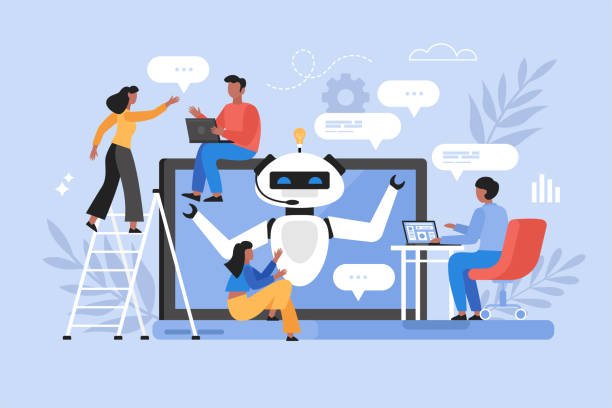
Influence of Artificial Intelligence on Content Creating
AI has revolutionized the way content is created, impacting everything from blogging to marketing. The application of Natural Language Processing (NLP) and machine learning algorithms has enabled AI to generate high-quality and relevant content with remarkable efficiency.
Artificial Intelligence (AI) has emerged as a transformative force across various industries. The influence of AI on content creation in English has been particularly remarkable, revolutionizing the way content is generated and consumed.
However, concerns about job displacement and the credibility of AI-generated content remain. Let's explore the influence of AI on content creation in English, highlighting the benefits, challenges, and future trends in this rapidly evolving field.

What is Artificial Intelligence (AI)
Artificial Intelligence, commonly abbreviated as AI, refers to the simulation of human intelligence in machines that are programmed to perform tasks that typically require human intelligence.
These tasks include learning, reasoning, problem-solving, perception, understanding natural language, and more. AI systems are designed to analyze data, adapt to new information, and make decisions based on the patterns they identify.
AI's Growing Influence on Various Industries
Over the past decade, AI has witnessed remarkable advancements, leading to its integration into various industries.
The impact of AI is transformative, revolutionizing sectors such as healthcare, finance, manufacturing, transportation, and more. AI's capabilities have enabled organizations to optimize processes, increase efficiency, and deliver personalized services to customers.
AI-powered technologies like machine learning and natural language processing have made significant contributions to improving decision-making and automating complex tasks.
Transition to AI-driven Content Creation in English
One of the noteworthy applications of AI is its growing role in content creation. With advancements in natural language generation algorithms, AI has become increasingly proficient in generating human-like text, including articles, blog posts, product descriptions, and more.
Content creators and businesses have started to leverage AI-driven tools to streamline content creation processes and provide a consistent flow of high-quality written materials.
AI-driven content creation in English involves the use of AI models that have been trained on vast amounts of textual data. These models can understand the context, structure, and semantics of the English language and use this understanding to generate coherent and relevant content.
This transition to AI-driven content creation has been met with both excitement and apprehension.
Benefits of AI in Content Creation
From improved efficiency and content quality to scalable personalization and data-driven insights, AI's integration in content creation promises to reshape the landscape of digital communication and marketing.
Let us delve into the diverse benefits that AI brings to the forefront of content creation, empowering businesses to engage audiences more effectively and deliver compelling, tailored content in the digital age.
#1. Improved Efficiency and Productivity
One of the primary benefits of using AI in content creation is the significant improvement in efficiency and productivity. AI-powered tools can generate content at a much faster pace compared to human writers.
This acceleration in content production allows businesses to meet tight deadlines, maintain a consistent content schedule, and handle large-scale content requirements efficiently.
#2. Enhanced Content Quality and Relevance
AI-driven content creation tools have advanced language models that can analyze vast amounts of data to understand the context, intent, and nuances of a given topic.
As a result, AI-generated content often exhibits a high level of relevance and quality. The content is tailored to meet the specific requirements of the target audience, resulting in more engaging and valuable material.
#3. Personalization at Scale
Personalization has become a crucial aspect of content marketing. AI enables businesses to personalize content for individual users or segmented audiences at scale.
By analyzing user data and behavior, AI models can deliver content that resonates with each user's preferences and interests. This personalized approach enhances user engagement, increases customer satisfaction, and fosters brand loyalty.
#4. Data-Driven Insights and Analytics
AI-powered content creation platforms can provide valuable data-driven insights and analytics. By monitoring user interactions and content performance, AI can identify patterns and trends that inform content strategy decisions.
This data-driven approach allows content creators to optimize their content for better audience engagement, conversions, and overall content effectiveness.
Overall, the integration of AI in content creation offers numerous advantages. It empowers businesses to create high-quality content efficiently, deliver personalized experiences to their audience, and leverage data-driven insights to continuously improve their content strategies.
As AI technology continues to advance, these benefits are expected to further enhance the effectiveness and impact of content marketing efforts.
Challenges and Concerns
While AI in content creation offers a multitude of benefits, it also presents challenges and concerns that demand careful attention. The following are the Challenges and Concerns that emanate from the disposal of Artificial Intelligence.
#1. Potential Job Displacement
The integration of AI in content creation brings forth a significant concern regarding potential job displacement for human writers. As
AI-driven tools become more proficient at generating content, there is a fear that human writers may face reduced demand for their services.
Striking a balance between AI-generated content and human creativity becomes crucial to ensure that human writers continue to contribute their unique insights and artistic flair to the content creation process.
#2. AI-generated Content Credibility
Maintaining the credibility of AI-generated content is of paramount importance. As AI systems generate content based on patterns in vast datasets, there is a risk of inaccuracies, misinformation, or biased information being disseminated.
Ensuring that AI-created materials undergo rigorous fact-checking and verification processes is essential to uphold the trust of the audience and preserve the reputation of businesses and brands.
#3. Ethical Considerations
The rise of AI-generated content raises several ethical considerations. Content creators must grapple with issues like plagiarism, where AI may inadvertently reproduce copyrighted material without proper attribution.
Additionally, AI models can be influenced by biases present in the training data, leading to the generation of biased content. Content creators must be mindful of these ethical challenges and implement measures to address them responsibly.
Striking a balance between AI and human creativity, ensuring content credibility, and addressing ethical considerations are essential steps to harness the full potential of AI in content creation. By doing so, businesses can capitalize on AI's efficiency and capabilities while maintaining integrity, trust, and responsible content creation practices.
AI Tools for Content Creation

AI-powered tools offer a wide array of functionalities that streamline the content creation process, allowing businesses and content creators to harness the power of AI while infusing their unique creative touch.
#1. Natural Language Processing (NLP)
At the heart of AI tools for content creation lies Natural Language Processing (NLP), a technology that empowers AI systems to understand and process human language.
By comprehending the intricacies of language, NLP enables machines to generate coherent and contextually appropriate content.
This capability facilitates the creation of engaging articles, blog posts, and other written materials, delivering content that resonates with readers.
#2. Content Ideation and Topic Generation
Generating fresh and relevant content ideas can be a challenge for content creators. AI-powered tools come to the rescue by analyzing vast amounts of data, including user interests and popular trends, to propose compelling topics for content.
Leveraging user behavior and real-time data, these tools aid content creators in identifying subjects that captivate their target audience, ensuring that the content remains timely and engaging.
#3. Automated Writing and Rewriting
AI takes content creation efficiency to new heights through automated writing and rewriting. By leveraging AI algorithms, these tools can produce draft content based on predefined criteria and user inputs.
This automation significantly speeds up the content creation process, allowing writers to focus on adding their creative flair and expertise to the generated material. This collaborative approach ensures content retains a human touch while benefiting from AI-driven efficiency.
#4. Content Optimization and SEO
Today, visibility plays a pivotal role in content success. AI tools offer content optimization capabilities, incorporating Search Engine Optimization (SEO) best practices to enhance the content's discoverability.
By analyzing SEO trends, keywords, and user search behavior, AI can optimize content to rank higher in search engine results. This optimization drives organic traffic to the content, enabling businesses to reach a broader audience and increase their online presence.
Future Trends in AI Content Creation
As Artificial Intelligence (AI) continues to evolve, the future of content creation promises exciting advancements that will revolutionize the way we interact with digital materials.
AI-driven technologies are poised to bring significant changes to various aspects of content creation, empowering businesses and content creators to deliver more engaging, personalized, and dynamic content experiences.
#1. AI-driven Multimedia Content
In the coming years, AI is expected to take a leading role in generating multimedia content, such as videos, images, and interactive elements.
Advanced AI algorithms, coupled with Natural Language Processing (NLP) and computer vision capabilities, will enable machines to create visually stunning and contextually relevant multimedia content.
This trend will enhance storytelling, allowing businesses to communicate their messages more effectively and captivate audiences across various digital platforms.
#2. Integrating AI with Human Creativity
The future of content creation will involve a harmonious blend of AI automation and human creativity.
Instead of replacing human writers and creators, AI tools will serve as powerful assistants, streamlining the content creation process.
Content creators will collaborate with AI-driven technologies to optimize workflows, gather data-driven insights, and enhance their work.
This collaboration will unleash the full potential of human creativity, enabling the generation of innovative and compelling content that resonates deeply with audiences.
#3. AI-powered Real-time Content Creation
AI's capabilities in processing vast amounts of data quickly make it well-suited for real-time content creation. In the future, AI tools may be able to generate content in response to user interactions and preferences in real time.
This dynamic content creation approach will create interactive and personalized experiences for users, tailoring content on the fly to match individual preferences, behaviors, and context. This level of personalization will foster stronger connections between brands and their audiences, resulting in increased engagement and customer satisfaction.
Conclusion
The rise of AI has transformed the landscape of content creation in English, ushering in a new era of efficiency, relevance, and personalization. As we continue to explore the possibilities of AI in content creation, striking a balance between technology and human creativity will be crucial. Embracing the potential of AI while upholding ethical considerations will ensure a future where AI and human ingenuity complement each other in creating captivating content.